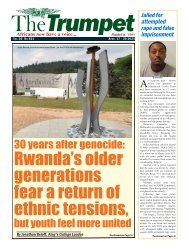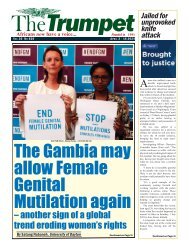The Trumpet Newspaper Issue 582 (October 19 - November 1 2022)
UN expert calls for end of attacks on persons with albinism.
UN expert calls for end of attacks on persons with albinism.
- TAGS
- black newspaper uk
- british black newspaper
- black newspaper scotland
- black newspaper aberdeen
- black newspaper glasgow
- black newspaper edinburgh
- black newspaper
- african newspaper aberdeen
- african newspaper edinburgh
- african newspaper glasgow
- african newspaper scotland
- african newspaper diaspora
- african newspaper usa
- african newspaper europe
- african newspaper uk
- african newspaper london
- african newspaper
- albinism
- soremekun
- cervical
Create successful ePaper yourself
Turn your PDF publications into a flip-book with our unique Google optimized e-Paper software.
News<br />
OCTOBER <strong>19</strong> - NOVEMBER 1 <strong>2022</strong><br />
<strong>The</strong><strong>Trumpet</strong><br />
Sierra Leone moves against cervical<br />
cancer with HPV vaccine<br />
Continued from Page 3<<br />
most common cancer among women<br />
with an estimated 266,000 deaths and<br />
528,000 new cases each year. Around 85<br />
percent of the global burden of cervical<br />
cancer occurs in lower income countries.<br />
According to the Sierra Leone Cancer<br />
registry, cervical cancer is the second<br />
most common, and number one killer, of<br />
all cancers among women aged between<br />
14 and 44 years old - and in 2021,<br />
approximately 504 new cases of this<br />
deadly cancer were diagnosed.<br />
“Today’s launch should be celebrated<br />
as a first step towards protecting girls in<br />
Sierra Leone from cervical cancer and<br />
providing them with a better chance of<br />
living longer, healthier lives and reaching<br />
their full potential,” said Thabani<br />
Maphosa, the Managing Director of<br />
Country Programmes at Gavi, the<br />
Vaccine Alliance. “Historically, HPV<br />
coverage worldwide, but especially in<br />
lower-income countries where the cancer<br />
burden is highest, was already too low.<br />
<strong>The</strong> pandemic and school closures have<br />
taken a further toll. Supporting countries<br />
to catch up and improve HPV coverage<br />
is a critical priority Gavi moving forward<br />
and will require action on the demandand<br />
supply-side. We look forward to<br />
working with our partners towards this<br />
goal.”<br />
<strong>The</strong> introduction of the HPV vaccine<br />
in Sierra Leone comes after several<br />
months of thorough planning led by the<br />
Ministry of Health and Sanitation’s<br />
National Immunisation Programme. In<br />
2014, a Gavi-supported HPV vaccine<br />
pilot project was undertaken in Bo<br />
District.<br />
This pilot demonstrated the country’s<br />
ability and readiness to implement a<br />
school-based vaccination programme<br />
nationwide. However, due to the Ebola<br />
Virus Disease and COVID-<strong>19</strong> outbreaks,<br />
the MoHS had to postpone the<br />
introduction of the nationwide vaccine.<br />
“<strong>The</strong> introduction of the HPV vaccine<br />
is a welcome demonstration of the<br />
collaborative efforts in Sierra Leone to<br />
support the good health of every child.<br />
Good health is a basic human right,<br />
which every child in Sierra Leone should<br />
enjoy, regardless of where they are in the<br />
country,” said UNICEF<br />
Representative, Dr. Suleiman Braimoh.<br />
More than 55 percent of the <strong>19</strong>4<br />
WHO Member States have introduced<br />
HPV vaccination, however in West and<br />
Central Africa the HPV vaccine has been<br />
introduced in only eight countries. With<br />
the launch, Sierra Leone joins the group<br />
of regional pacesetters introducing the<br />
HPV vaccine into routine immunisation<br />
programs as a key strategy to prevent<br />
mortality and morbidity due to cervical<br />
cancer.<br />
“We are in the era where no one<br />
HPV Vaccine launch in Sierra Leone - (Photo - Saffea Gborie, WHO)<br />
Dr Austin Demby, Sierra Leone's Minister of Health and Sanitation<br />
should suffer or die from diseases that are<br />
preventable with the use of vaccines.<br />
And, as we make these lifesaving<br />
services accessible to safeguard the<br />
health of women and girls, we are also<br />
contributing to empowering the<br />
individual, the community, as well as<br />
enhancing sustainable social and<br />
economic development of the nation”,<br />
says Dr Steven Velabo Shongwe, WHO<br />
Representative in Sierra Leone. “We urge<br />
authorities and parents to ensure that their<br />
girls are protected against the distress of<br />
cervical cancer by protecting them<br />
against HPV at an early age”.<br />
“Cervical cancer is the second most<br />
frequent cancer among women in Sierra<br />
Leone. <strong>The</strong> introduction of the HPV<br />
vaccine is a momentous milestone in<br />
protecting the health of girls and reducing<br />
their risk of future illness. This campaign<br />
also provides an important opportunity to<br />
expand education and outreach to<br />
promote uptake of cervical cancer<br />
Page7<br />
screening and treatment services by older<br />
women. Alongside HPV vaccine rollout,<br />
these services are essential to eliminating<br />
one of the most preventable cancers,”<br />
said Nadia Rasheed, UNFPA<br />
Representative.<br />
To ensure the effective introduction of<br />
the vaccine, Gavi is supporting the<br />
procurement and installation of 463 sets<br />
of solar refrigerators to help strengthen<br />
cold chain systems and ensure that<br />
vaccines stay at optimal temperatures<br />
during shipping, storage, and delivery to<br />
vaccination points. In addition, 1,500<br />
healthcare workers have been trained to<br />
administer this lifesaving vaccine.<br />
Gavi, <strong>The</strong> Vaccine Alliance has<br />
worked with the MoHS and the<br />
government of Sierra Leone since 2001<br />
to extend equitable access to<br />
immunisation services to every child.<br />
This support, amounting to US$101<br />
School children participating in the HPV Vaccine launch - (Photo - Saffea Gborie, WHO)<br />
million to date, has included the<br />
procurement of vaccine doses and cold<br />
chain equipment, including for COVID-<br />
<strong>19</strong>, as well as investments in health<br />
systems and technical assistance to<br />
support routine immunisation, new<br />
vaccine introductions and supplementary<br />
campaigns.<br />
Through the leadership of the MoHS,<br />
intensive sensitization is ongoing at a<br />
community level to help raise public<br />
awareness about the HPV vaccine and<br />
uptake – focusing on the targeted age<br />
group of girls, community members and<br />
leaders, so they are empowered and<br />
informed about the tools available to<br />
prevent cervical cancer. With support<br />
from partners, a wide range of materials<br />
have also been developed to inform and<br />
respond to the questions which girls,<br />
parents, and caregivers might have about<br />
this new vaccine.

















